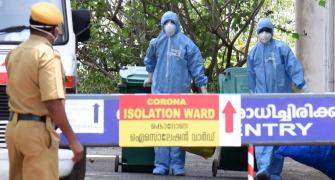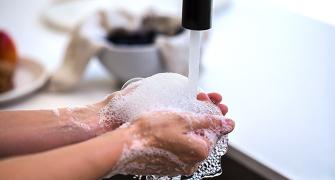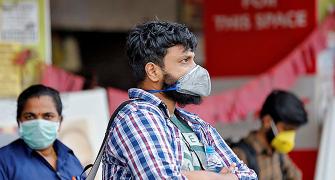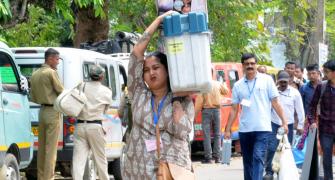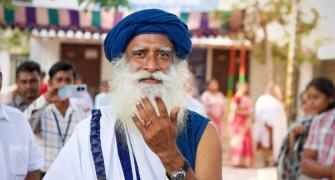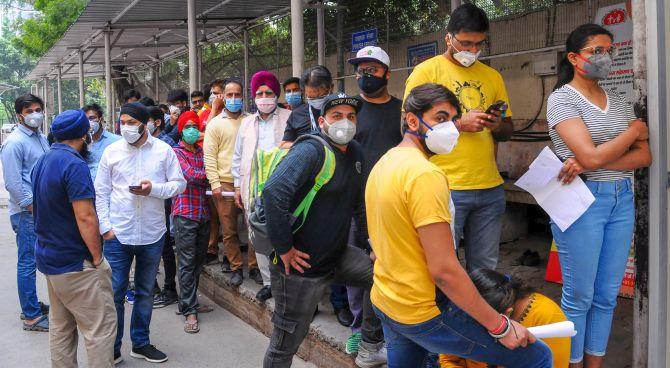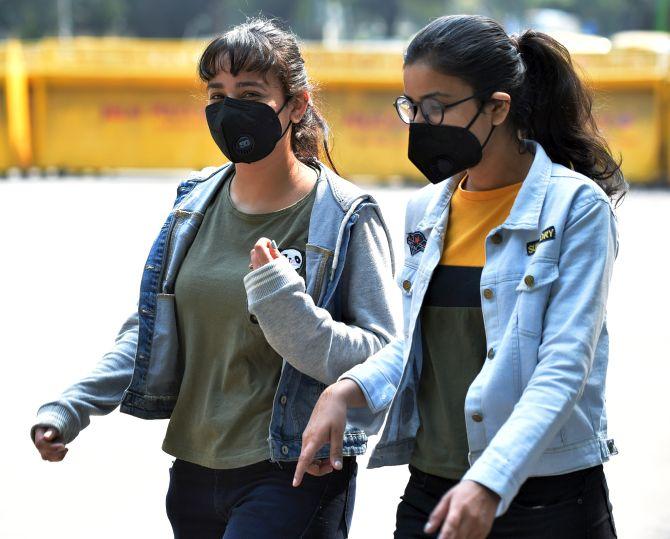A virologist answers key questions on the deadly virus presently haunting the world.
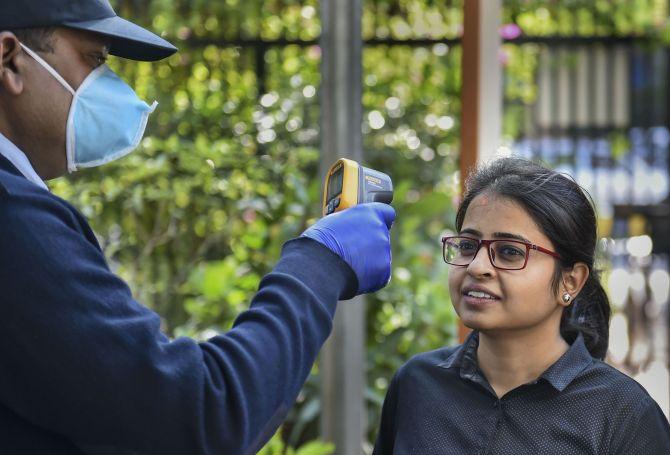
Dr Shashank Tripathi spends his days studying viruses.
Especially emerging viruses of the flu family and its host interactions.
Of late, he has been following the progress of the coronavirus pandemic and plans to study this virus as well.
COVID-19, is caused by SARC-CoV2, which is the newest and most notorious addition to the virus clan, a clan which has existed for millions of years and is considered non-living, but when its member enters a host they come alive, start replicating and cause diseases.
Dr Tripathi is an assistant professor at the microbiology and cell biology department at the Centre for Infectious Disease Research, Indian Institute of Science, Bengaluru.
He answered Vaihayasi Pande Daniel/Rediff.com's five questions on COVID-19:
How long does the coronavirus stay alive on inanimate surfaces?
Now there is scientific data on this. They have shown in aerosol form (when the virus from body fluid droplets mixes with the air to form aerosols) you can detect it up to 2.5 hours on an average.
But on hard surfaces like steel or plastic it can stay around from 13 to 15 hours.
That is the reason why it has been emphasised a lot that the primary source of acquiring this virus is going to be through fomites (inanimate objects that are contaminated with viruses) or touching hard surfaces and getting it onto your hands and bringing to your face.
That is where the virus is going to linger on and that's going to be the primary source from where people may get it, inevitably.
If anybody is sneezing, then, of course, people would naturally practice (prevention or caution where they sneeze). Logically, with all the information around, one would expect that they are practising (caution).
If someone has sneezed in a room and the droplets have come on a plastic and steel surface, and the person has moved out of that room, the virus will still linger around there for almost half a day.
So that's why the practice to watch hands several times and sanitizers.
So how long on hard surfaces?
Data is that on plastic it can stay longest. Up to 15 hours.
There are so many variations. If we are talking about different kinds of metal -- on steel it is lesser than plastic, on copper lesser than that. On cardboard and carpet it is lesser than that. It varies a lot.
But longest it can stay is on hard plastic surfaces.
In aerosol the smallest time -- about two hours or so.
One knows the limitations of travelling in public places and crowded places. But supposing one is travelling in an AC taxi or air-conditioned transport -- metro/bus etc -- what are the chances of getting the virus from the circulated air?
In a taxi (for instance) if the air is circulating, on a regular basis, the droplets will go away, most likely.
But the droplets may have deposited on door knobs and handles, which are of plastic, then even if the person, who has used it, before, has gotten out of the taxi, the person who is going to use it next, they can come in contact.
So that is why it is recommended that any time you go out and you believe that you have been touching surfaces, that may have this virus, then first of all you should avoid bringing your hands to your face and whenever you get a tap (wash your hands) or you should use sanitizer and rub your hands.
But these days it is very hard to find sanitisers at any chemist shops. Yes, sure soap and water is the best, but one cannot always get to it immediately.
What should one do?
You have to minimise risk, first of all, by avoiding. If there is very active transmission going on in an area, it is best is to stay home and not travel at all.
If you are forced to do so, then it is recommended that you do carry sanitiser or a soap.
And in absence of sanitiser?
So 70 per cent alcohol that will do the thing.
If you apply too many times 70 per cent alcohol your skin can get a little dry, but that's not a big concern if you are trying to prevent the virus.
So in absence of sanitizer just look for some product which is 70 per cent alcohol?
Right, right.
Does it get transmitted through food? I mean, is there any precautions one should take? Since food is often being handled in India by many people (not with gloves).
Should one be concerned about what one eats from outside?
Food, at least in India, we pretty much cooked it until everything is dead, so...!
I don't think it can spread from food itself. Like I said, the hard surfaces such as plastic or steel -- A lot of our utensils are of hard metal and a lot of the time takeaway food is in plastic containers. So the restaurants, who are preparing the food, they have to maintain good hygiene levels.
So handling of food is important to some extent?
Food may not be contaminated, but the containers, where food is being prepared or being delivered, may carry it (the virus), if good hygiene is not practised.
What about masks?
So, there are different kinds of masks, right?
The most common is a surgical mask, which people are wearing.
And then there is the N95 respirator.
So one thing one has to know is that when you wear masks, masks are disposable and for one-time use only.
So if everybody stashes masks for a supply of two months, going through several masks a day we are going to run out of it one day. So that's not wise.
A mask is needed or is helpful if you are infected, it will prevent the spread definitely.
But it has to be the right mask?
Even a surgical mask if you are coughing and sneezing and you are having various symptoms, you should wear a mask, so you do not spread by the air droplets.
But if you are a healthy individual, and you are not in a setting where you are supposed to be exposed, wearing a mask will naturally make you touch your face, more often than usual, you will try to adjust your mask several times.
If you are going on, say a crowded local train in Mumbai, people want to wear masks because they are afraid that they are so close to other people. So do you suggest masks for them?
Yes, in such close contact I think it is okay to wear a mask.
But, like I said, if you are a healthy individual better to prevent your hands from coming to your face in a local train.
As soon as you go off the train, use a hand sanitizer.
You can wear a mask, but it does not have to be a N95 respirator or a really high class mask. Frankly, you can wrap your face with a good piece of cloth and wash that cloth every day or keep a couple of them.
What are the myths that you would like to dispel?
There are myths going around about the virus spreads through chicken or different kinds of food sources. That is not real. If we cook our food properly there is no reason it should be spreading from there.
Is it spreading from uncooked food? Uncooked meat?
No, no, that's not involved in the transmission of this virus.
Posters have been going up saying this is coming from uncooked non-vegetarian items.
So that is what I am trying to clarify. Entirely a myth.
Food is nowhere in the chain of transmission of this virus. Only human to human transmission and via aerosol and hard surfaces.
If your food is clean and cooked properly, there is no reason to believe it will have the virus. That is one myth to be dispelled.
The other is that there is a lot of information or advertisements going around about people claiming to have a cure for it. That also is entirely untrue.
There are drugs which have been in clinical trial and been tested on patients for this virus which were anti-HIV drugs or drugs that were developed on similar class of viruses.
These are the only drugs which are, even now, as of today, being tested, which are showing some promise in real time in patients in China and elsewhere.
So one should be very wary of these false claims of having a cure for this particular virus. That is not available.
The best till now is to prevent yourself from getting infected.
And the top things to keep safe?
Currently in India all cases are travel related and there is no evidence of local transmission. In case that happens and number of cases start rising in your location, then if your work allows you to stay home and work from home, you should do that.
If that’s not possible, and if you have leave accumulated, which you plan to use later on for holidays, I would say rather use that and stay at home.
Watch your favourite shows that you have been watching, but be aware of the news. Go to reliable news sources.
Go to the WHO Web site or the CDC Web site or the Ministry of Health and Family Welfare Web site in India.
Don't go to random blogs and other unreliable Web sites and get false information.
Washing hands is the number one way you can prevent from getting it.
Be vigilant whenever you are going out, be conscious that what are the objects you are touching.
If you have touched a potentially contaminated object, then try to be very cognisant that you don't bring your hands close to your face unless you have sanitised them.
And also be careful of what's coming into your home too? Whether it's groceries or whether it's provisions or food delivery?
Just be vigilant. Keep an eye on all the things.
And if you have any symptoms, then just isolate yourself and visit the doctor as needed.

